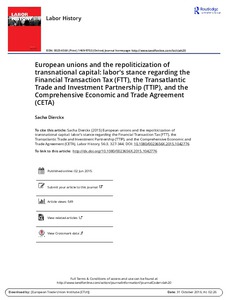European unions and the repoliticization of transnational capital: labor's stance regarding the Financial Transaction Tax (FTT), the Transatlantic Trade and Investment Partnership (TTIP), and the Comprehensive Economic and Trade Agreement (CETA)

2015
56
3
July
327-344
financial market ; labour movement ; social movement ; trade agreement ; trade union role ; TTIP
Trade unionism
http://dx.doi.org/10.1080/0023656X.2015.1042776
English
Bibliogr.
"This article argues that labor and social movements should repoliticize the transnationalization of capital in production and finance. The neoliberal era has demonstrated the power asymmetry between global capital and national labor. It seems that academics, trade unions, and progressive politicians have accepted this upscaling of capital to the global level as an irreversible fact that cannot be challenged. This article claims that progressive labor and social movements should, first, repoliticize the power of global capital and, second, try to scale down capital. The article studies three cases from the European Union to examine whether trade unions are trying to repoliticize, and succeeding in repoliticizing, global capital's power. It is concluded that repoliticizing and challenging the power of transnational capital is not impossible, but not easy either, and that trade unions need to focus more on these struggles."
Digital
The ETUI is co-funded by the European Union. Views and opinions expressed are however those of the author(s) only and do not necessarily reflect those of the European Union or the ETUI.